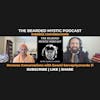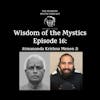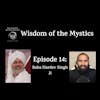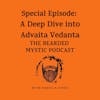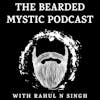Wisdom of the Mystics: Thich Nhat Hanh
In this episode, The Bearded Mystic Podcast discusses the wisdom of the most inspirational Buddhist monk Thich Nhat Hanh, who inspired many with his calming presence and his teachings of compassion, oneness and peace.
I hope you enjoyed listening to the Wisdom of the Mystics series and if you are interested in listening to more episodes about Non-Duality and a deep dive into the Bhagavad Gita, please follow/subscribe to this Podcast.
Thoughts on the Upanishads, Conversations with the Bearded Mystic, Guided Meditations, and much more only on Patreon, Buzzsprout Subscriptions, Apple Podcast Subscriptions and Supercast.
Patreon: Support The Bearded Mystic Podcast and get ad-free, bonus episodes along with many more benefits:
https://www.patreon.com/thebeardedmysticpodcast
Buzzsprout Subscriptions: Support The Bearded Mystic Podcast and get ad-free, bonus episodes: https://www.buzzsprout.com/1800416/subscribe
Direct & Unfiltered with The Bearded Mystic is a great format to ask The Bearded Mystic (Rahul) whatever question you have in your mind. Submit your question by completing this survey please.
Join The Bearded Mystic Podcast Discussion Group on Whatsapp: https://chat.whatsapp.com/GcCnyrjQwLuEPHBaVA6q9L
Be notified of my weekly virtual meditation session followed by a Q&A Discussion via zoom (Notifications only):
https://chat.whatsapp.com/DcdnuDMeRnW53E0seVp28b
If you would like a one-on-one meeting with me via Zoom, book here:
https://calendly.com/thebeardedmysticpodcast/1on1meetings
Please rate and write a review for this Podcast: https://www.thebeardedmysticpodcast.com/reviews/new/
You can follow me and contact me on social media:
Website: https://www.thebeardedmysticpodcast.com
TikTok: https://vm.tiktok.com/ZMdk3HPJh/
Instagram: https://www.instagram.com/thebeardedmysticpodcast/
Youtube: https://www.youtube.com/c/TheBeardedMysticPodcast/
Twitter: https://twitter.com/bearded_mystic
Facebook: https://www.facebook.com/The-Bearded-Mystic-Podcast
Hello and welcome to the Bearded Mystic Podcast and I'm your host, Rahul N. Singh. Thank you for taking out the time today to either watch or listen to this podcast episode. Today, we will be continuing on with the series called Wisdom of the Mystics. But before I do start, there's a few things I would like to let you know about. To give your support to the Bearded Mystic Podcast, you can sign up to our Patreon page where you can get ad-free and bonus episodes and other benefits depending on the tier that you select. Details in the show notes and video description below. You can also get bonus episodes like thoughts on The Upanishads, Guided Meditations and conversations with the Bearded Mystic on Buzzsprout subscriptions, and the details for that are in the show notes and video description below.
Every Saturday at 11:00 AM Eastern Standard Time, there is a free virtual meditation session along with a discussion and Q and A for around one hour. Please find the details in the show notes and video description below if you're interested in meditating with us as a community. If you have any questions, you can ask them in the new series that I have, which is called Direct and Unfiltered with the Bearded Mystic. More information is in the show notes and video description below. Please do like, comment, and subscribe if you're watching this on YouTube. If you're listening to this on your favorite podcast streaming app, then please do rate and review the podcast. But most of all do follow, or subscribe, to get future episodes. If you remember last month, we looked at the teachings of Jesus Christ, but not according to the Bible, but according to the gospel of Thomas. But today we will be looking at the teachings of Thich Nhat Hanh and this is because on January 22nd, 2022, he had passed away. So in one celebrating his life and his teachings, which continue to live on, we will be celebrating it with a few of his quotes because his life was one where it was all about peace, non-violence, interfaith dialogue, a true sage. It's an honor really to be able to share some of the wisdom that he gave and be able to express my thoughts on the quotes that he shared. The first quote. The true person doesn't go looking for an outside Master. We are in charge of our own destiny and we have to be responsible for each of our words, thoughts, and actions. Mindfulness will help. Then we realize, I'm thinking like this. I'm responsible for these thoughts. I've spoken like that. I'm responsible for my words. I'm doing this, and I'm responsible for this action. We have to know that each word, each thought, each of our actions carries our signature. We are responsible for it and that is called being in charge of ourselves. Wherever we stand, wherever we sit, we are the true person. We are masters of ourselves and wherever we are, we are ourselves. We only need to live these eight words and it's enough to make us Master Linji's student worthy, to be his continuation 'Wherever we are, we are our true person. Write these words and hang them somewhere to remind yourself. A very beautiful quote. And again, if we really think about it, if we really contemplate upon what he said, if we digest the message that he's given. We can see how deep his words are. We can see how they penetrate into our being, and that's because they're coming from a place of truth, a place of honesty, a place of humility, and these are the virtues that we look for. In Vedanta this is exactly what we are looking for. Let's have a little bit of a deeper dive into the quote. Now, he talked about the outside master. Yes, the outer master will point, they will direct us on what to look at or what to understand is the Truth. , but really it's the inner master that acts upon that pointing, whatever that pointing was, the inner master grasps and then absorbs. And that's the whole point. We can all follow an outside master. We can all follow a teacher, a Guru, but what benefit will it bring if we are constantly not practicing those teachings. If we're not looking at where the teacher is pointing, but instead looking at the finger, you know, like they say that there's no point looking at the finger pointing to the moon when you should be looking at what the finger is pointing to, which is the moon. And the same way we need to be in awareness rather than just looking at the finger that's pointing to awareness. Now our destiny is all up to us. The actions we do determine the next effect and the next cause for that very action. So we need to see the root cause of our actions, the root and the base of our actions. Why has it stemmed that way? Now, even when it comes to thought and our emotions, if we've held ourselves responsible, would we ever fall under that feeling of not taking responsibility? See, a lot of people that have an outside master will blame, will put all the blame indirectly to the Master. Like, oh, you know, I am not practicing your teachings. That's blaming the master. Are you saying the master's teaching is inaccessible? Is not worthy of practice? These are the ways that we think we are being smart, but actually, our thoughts, our emotions, and our actions. We are responsible for not our master. If we are not following the words of the master, we cannot ask for the master to help us when we are not willing to help ourselves. Now, by taking responsibility, by being more mindful, we slow down our thoughts, we also slow down our actions and our words are extremely thought out. So even when we are going to say something, it's going to be measured. It's going to be thought in the long term, as well as the short term effect. See, our actions are very important. Our actions can define what hurts another person. Yes, our thoughts and our words can also hurt somebody, but it's our actions that matter the most. Now, just imagine if we slow down our thoughts and we think about the action we are about to do, and if that action is not the correct action, our thoughts, because they've slowed down, because the intellect is in motion, we will not act upon that action which will cause more suffering. So we need to hold ourselves accountable for every word, thought and action. Now, if we hold ourselves accountable, then we are responsible, and then we don't even blame things on habit. You know, how many times have we blamed things on habit? Oh, I didn't mean to do that. That's just the way I am. That's my nature. Here Thich Nhat Hanh is not giving us the opportunity to even blame it on habit because we are the masters of our destiny. We can change if we really want to. If we really want to transform, we will take that opportunity to transform. Now doesn't the outer master think thoughts for us, say words for us or act for us? Absolutely not. We do it ourselves. So we are in charge. We are our own masters. Even in bhakti, even in devotion. Even when we surrender to the Lord, even then, we are still in charge of our actions. Do we truly say that the Lord does everything? Do we really believe that? If we harm another person, do we blame it on the Lord? No. You know, often I hear people say that if I say something good, then it's my master's voice. If I say something bad that didn't sit well with you, then it was my shortcoming. But is that the act of a surrendered person? Is that the words of a surrendered person? And this is why truly somebody who is in devotion is normally one that has really, has really exercised their intellect and more so has already discerned so much that now they're so intelligent that they're able to catch their ego out before it goes on a spree of damage. You know, it's able to calm it down. If we are holding ourselves accountable, we will utilize our viveka even more our discernment, a lot more. What's the best action to do? What will cause the least amount of harm? Is this real or is this an illusion? Am I still going back to my body in mind? Am I still chasing my likes and dislikes and or am I still attracted or repulsed by things? Or have I attained the state of balance? When we actually discern a lot more. We get to a more stabilized balance, a more stabilized peace and happiness. That is a practice of Vedanta. That's what Vedanta's all about. And Thich Nhat Hanh is not talking about anything different. This is why there's a synthesis in the basic elements of our teachings, and that's why I don't think it's right for us to condemn another religion. Or dislike another religion. We might disagree with the philosophy, but there are some truths that we have to acknowledge which are universal, and those things should be celebrated, and those things should be upheld by each person of their religious background. Thich Nhat Hanh also mentions the true person, so what is the true person here? It is that Formless Awareness, the Atman. That's the true person. It is ever present. And remember he says worthy to be his continuation because remember, Master Lin ji is a true person. So he says the one that follows those eight words of 'wherever we are, we are our true person' is a continuation of Master Lin ji. So nothing ever dies either, and that's why the true person is Formless Awareness, because it's always continuous. There's never a moment where it stops and wherever we go, whatever we do, we are ourselves. It is inescapable. We have no choice in this matter. We cannot run away from that responsibility. And as Master Lin ji says, ' wherever we are, we are our true person.' Here Thich Nhat Hanh or lovingly known as Thay is telling us that we can't escape what we truly are, so we must pay heed to those very words. Really feel and experience that we are the true person and that we are nothing else other than That. Remember, the true person is the Atman, is Nirguna Brahman, Formless Awareness. Now the second quote. In the Buddhist tradition I am part of, we do a practice called Touching the Earth every day. It helps us in many ways, you too could be helped by doing this practice. When you feel restless or lack confidence in yourself Or when you feel angry or unhappy, you can kneel down and touch the ground deeply with your hand. Touch the earth as if it were your favorite thing or your best friend. A very beautiful quote, and this is a beautiful practice to feel connected to existence, to feel connected to the Earth. To Mother Nature because touching the earth is our home. We cannot escape this wherever we go on this earth, whether to the mountains or to the marketplace, it is our home. It will always be our home. By remembering the longevity of the Earth, we understand the longevity of life, of existence. We see how it's always continuing, always in motion. This earth is called the Mother, Dharti Maa This earth looks after us like a mother looks after us, it gives us birth, sustains us, and then we go back to it when we die. That's why the earth is being valued here, honored here. It's not saying that the earth is God. It's saying that the Earth has helped us and the Earth needs to be looked after. Therefore to feel grounded, to feel safe, we can kneel down and touch the ground with our hand, and peace will be there. Practice it. Go outside for a bit and just touch the ground. Feel your feet touching the ground, and feel that purity coming from the earth that love, that connection. The connection that shows you what you really are. All this really is, is just a practice of awareness. That's all that Thay is really asking us to do. So this earth is really your best friend and will always be there for you. Always will be there. It will never leave you. It will never disappear from you. When you die in terms of the body and mind. The earth dies along with that body and mind and finds a new way to rejuvenate it through the earth itself. And this earth also has the answers etched in life, the answers for the Truth, or it has the answers in silence and we can pick which way we want to go. Either in the marketplace or in the solitude of a mountain, in the solitude of a cave. Even there we can find mother nature's love and presence. When we touch this earth, remember the purity. Remember how you feel grounded and go back into Formless Awareness. Quote Three. When I hold a piece of bread, I look at it and sometimes I smile at it. The piece of bread is an ambassador of the Cosmos, offering nourishment and support. Looking deeply into the piece of bread, I see the sunshine, the clouds, the great earth. Without the sunshine, no wheat can grow. Without the clouds, there is no rain for the wheat to grow. Without the great Earth, nothing can grow. That is why the piece of bread that I hold in my hand is a wonder of life. It is there for all of us. We have to be there for it. Eat with gratitude. And when you put the piece of bread in your mouth, chew only your bread and not your projects, worries, fears or anger. This is the practice of mindfulness. You chew mindfully and you know that you are chewing the bread, the wonderful nourishment of life. This brings you freedom and joy. Eat every morsel of your breakfast like that. Not allowing yourself to be carried away from the experience of eating. This is a training. Now what a wonderful tool for mindfulness, for meditation. To think of the whole process of food and how it gets to us. You know, from a single grain of rice, it has a rich journey, and that richness is what nourishes you. Think about it? When that rice ends up being on your plate. Imagine the logistics that has to take place in order for one single grain of rice to reach to your plate. Think of the whole process. Think of the journey that single grain of rice has traveled. Amazing What we eat in seconds is the whole life for that grain. What takes us 20, 30 seconds to eat has spent many years being developed, being sustained, and then eventually reaching us. But the problem with us is that normally when we eat, we think of other things. We think of things other than what we are eating or gratitude for what we are eating. Yeah, we may do grace in the beginning, but what about during the meal? What about actually when we are chewing our meal, when we actually are absorbing the nutrients of that meal? Today, things have got so bad where even the relationship that children are meant to have with food is not being developed either. What we find is because of what could be laziness, what could be the fact that we have very busy lives, that we stick a phone in front of our children just to make them eat. And as much as you know, we may say that we do not want that to happen, but we look at our own convenience, but we don't see the harm that that is projecting. Now that child is not able to create a relationship with food. In fact, now it sees food as a tool to get what it wants. A tool for the dopamine hits. The dopamine hits that our brains is not able to combat. We are expecting our children to combat it when we stick a phone or an iPad or any technological device in front of our kids. We have to ask ourselves if we are willing to pay that price. We have to inquire. One day when I become a father, am I going to also do the same thing? Am I also going to stick an iPad or a phone in front of my child? Only time will tell. But after reading this, I kind of feel maybe I shouldn't . but again, time will tell. So as I said this is detrimental to the child and detrimental to ourselves because I can easily say that, oh, well, I don't look at my phone, but sometimes I do, and sometimes I'm watching tv. So even my relationship with food has to develop and change. We have to ask not only for ourselves, but for the ones that we love too, are we ruining their relationship with food? If we eat mindfully, we will understand whether we are full or not. Think about it. If you're watching tv, if you're looking at our devices, how are we actually aware of our own body and what it is intaking? How aware are we? That's why it's very important that we are very mindful about how much we eat, about what we eat. If we eat unconsciously, it will cause unhealthy eating habits. We all know this. So just focus on eating, be fully into it. And I would even say, I would even go far as this. Don't even think about scriptures. Just think of what you're eating right now. Don't think about meditation. Just be with the food that you have right now. And when you have this healthy relationship with food, when you show that gratitude, that gratitude will also spread out to other people. It will naturally go towards other people. It will naturally gravitate towards others. The fourth quote. When you begin to practice Buddhism, you begin as a part-time Buddha and slowly you become a full-time Buddha. Sometimes you fall back and become a part-time Buddha again. But with steady practice, you become a full-time Buddha again. Buddhahood is within reach because like the Buddha, you are a human being. You can become a Buddha whenever you like. The Buddha is available in the here and now. Anytime. Anywhere. When you are a part-time Buddha, your romantic relationships may go well some of the time. When you're a full-time Buddha, you can find a way to be present and be happy in your relationship full-time no matter what difficulties arise. So being the Buddha really is about being right now. Here. Present. And we love being part-time, part-time seekers, part-time disciples, part-time spiritual people. And this part-time actually takes more energy out of us, more energy to practice than if we actually were just full-time. Now, what full-time means is simply this, that you understand that you are a spiritual person. That's it. The Buddha is within you. You are the Buddha, you're a continuation. Therefore, if you are a continuation, there's no need for you to feel that you need to become something else. That you have an individual to be, that you are Rahul or, that you are so and so. You are the Buddha full-time. And even as he said, when you're a full-time Buddha, you can find a way to be present and happy in your relationship, full-time, your relationship with others, with your spouse, your children, your friends, your work colleagues, your school friends, everybody. And it doesn't matter what difficulties come up, you're able to deal with it mindfully, with a calm mind, with a tranquil mind that comes up with the solutions that will benefit many. That is discernment. And it arises from a calm mind. See if we are full-time, it becomes effortless. We don't have to put a hat on saying that now we are the Buddha and now that we are Buddha, we can be holy and be great in this retreat for a weekend. And then when we go back home, we are back in that same mess. We're going back to our same old habits. Then what value was the retreat? That's the question that we have to ask? The Buddha is life itself, and therefore it doesn't take effort to do anything. It's a natural occurrence. And life is a ceaseless joy, a ceaseless happening, and that is Buddhahood. So we don't have to think about the future of becoming Buddha, we can do it right now. And again, isn't that the same message of Vedanta, that you are Formless Awareness, you don't have to be Formless Awareness tomorrow or in the next moment or next year, or in old age. You are Brahman right now. The only difference is that the Buddha or the Rishi knows it, we are still asleep and we are refusing to wake up. That's all. The fifth quote. Observe the changes that take place in your mind under the light of awareness. Even your breathing has changed and become not two, (I don't want to say One) with your observing Self. This is also true of your thoughts and feelings, which together with their effects are suddenly transformed. When you do not try to judge or suppress them, they become intertwined with the observing mind. If you look at this quote, it reminds you so much about Neti-Neti as a process. This message is purely nondual. And the emphasis really is to remain as the observer as much as possible. To stay as the observer, to resist becoming the individual again. So every thought arises, be the observer. Every use of the senses, be an observer. Every action that we do, be the observer. Put everything in awareness and stay in awareness. We don't need to move anywhere else. And another thing that he says, which is really important, is he says, with our thoughts and feelings, we shouldn't judge them or suppress them. We feel they are negative thoughts, we must observe them. Observe that negative thought, observe the negative feelings, observe the negative action, because that's the only way we can stop them when we are able to observe them fully without judgment, without condemning them or celebrating them, just observe them. He says another thing, become not two, and he says he doesn't want to say one. Now, obviously he believes in oneness. I mean, it is pretty obvious with the books that he's written and the talks that he's given. Thay was big on oneness, but he is saying not two, and refusing to say one is a stroke of genius. It's when you refuse to put a number to it, to awareness. That is surrender. A number doesn't need to be mentioned then. Once you say not two, you're not saying one either. And I think right now, I've realized how powerful that word 'advaita' really is. Non-dual, non-twoness. Wow, it's not always when you get kind of a, a realization of something on the podcast as I'm recording this, but it's. But I, I dunno if I can really explain the power of what I mean by not two When I, when we refuse to give it a number, give it an identity, the directness of it penetrates and dissolves any sense of duality? Any sense of duality? Very beautiful. But I want to go back to the first line that he mentioned because yes, I have had this sudden realization, but prior to that, this is a practice we need to do, and this is a practice that we emphasize. not only in our Bhagavad Gita series, but generally when we do our live sessions or anything like that, observe the changes that take place in your mind under the light of awareness. Remember, anything that changes is Asat - unreal. Observe it, place it under the light of awareness. Be aware of anything that changes, thoughts, feelings, sensations, emotions, anything that changes. Put it under the light of awareness and remember, once you put something under the light of awareness, you realize that there is only awareness. You go straight to the Changeless, and this is why something like this quote that Thay just said. You can miss the depth of it like that. You may not even grasp what he's trying to say. We just read the lines and we think that's it. But always with these masters, especially someone of the caliber of Thay, of Thich Nhat Hanh. Read between the lines, it's very necessary. The Sixth Quote. Which will be the final one that we're going to be looking at today. Understanding impermanence can give us confidence, peace, and joy. Impermanence does not necessarily lead to suffering. Without impermanence life could not be. Without impermanence, your daughter could not grow up into a beautiful young lady. Without impermanence, oppressive political regimes would never change. We think impermanence makes us suffer. The Buddha gave the example of a dog that was hit by a stone and got angry at the stone. It is not impermanence that makes us suffer. What makes us suffer is wanting things to be permanent when they are not. It's a weird quote to end with because yes, Thay's body is impermanent, we know, because it's no longer in front of us. And I've never met Thich Nhat Hanh. I've only read some of his works here and there. Um, but he helped me, but he helped me get over the grief of my brother. He was one of the, he was one of the guiding lights that helped me in that time, as well as my own Master. But, um, what obviously is permanent is that even a year after his passing, we are talking about him. We are talking about his words, his teachings, and this is why you want to be remembered for the good that you give to the world. Yes, we may study tyrants in history lessons, but when it comes to life lessons, we listen to these sages, these masters like Thich Nhat Hanh, that's the real history we should be reading. People that can really transform our life and it's sad for me that we don't value such people when they're alive and they are in front of us. We tend to bypass them, tend to ignore them, find faults in them but I pray that we always, at least those of us that follow this podcast, and whether you're the speaker or the listener, it doesn't matter that we together value such teachers, and this is the whole purpose of wisdom of the Mystics. It's, it's about celebrating those people that changed the course of the world, even though we don't see them being political figures, but their thoughts help the rest of humanity and that's what matters. Let's explain this verse a bit more. Nothing is permanent in this life on earth or this universe. Therefore, live every single moment you have mindfully, and live it to the max. Celebrate it. Be in joy, be in bliss. Just celebrate. Just remember that you have a breath that you're able to inhale right now, and exhale, and then inhale because each time you have that opportunity, you have the opportunity for Jivan-mukti. So do not think that your breath is worthless. It has so much value, so much value. and when we understand that there is fragility in life. , the more grounded we become too, because the more we want to be in awareness because awareness doesn't change. Our body is changing, our mind is changing. This body that was there 10 years ago is not the same body today. The same body that was there as a toddler is not the same body that is today. I've watched those changes. You have watched your body change, your mind change, your thoughts and beliefs change, but something has been watching that has not changed. That is the permanent One. But the other things that are impermanent, that are transient, that change, we should never want them to be permanent. A desire met is only a meeting point. After that it's impermanent. It has, it is a desire cannot permanently be met because another desire will take its place. That's the nature of change. So impermanence is a great teacher because it shows us how that which is permanent is worth sticking to, is worth being associated with, is worth striving for. Nothing is permanent except Formless Awareness and this transient nature is equally as beautiful because without Formless Awareness, without that permanent, we cannot appreciate that, which is impermanent. We cannot enjoy, even though we know it's short-lived, we can still enjoy the joy that it gives, the bliss that it gives, the happiness that it gives, the peace that it gives and this transient nature has a purpose, and that is that impermanence doesn't make us suffer, but it shows us that wanting things to be permanent is what makes us suffer. What a beautiful insight. That's the purpose of the transient nature, that impermanent nature to show you that don't ask for this to be permanent. It will never be permanent. Whatever is born will die. Whatever changes is impermanent. It's going to have a demise one day. It has a sell-by date, but go to that which has no sell-by date, which has no end date, which has no beginning, no end. Which does not belong to time, which does not belong to a place, go to that awareness because awareness is that which is permanent. As I end this episode and I end on the note really, that although it's been one year since Thay has left his physical form and has entered this awareness in its full capacity, if one may use those words, but as he said, his words are remembered, and the more they're remembered, the more we feel that he's still alive. I truly feel, and this has been true for all the mystics that I've spoken on, I really feel that they're still alive through their words and their words, whenever we hear them, we give them a new breath of life. We bring a pulse back to those teachings. So I hope we understand that someone like Thay who only passed away last year, he still lives in our hearts. And this is a message really now to his disciples, his followers, who may come across this. And again, I will ask for forgiveness if I have not spoken, um, to the great level of insight that Thay obviously would've given with his quotes. And this is only my humble attempt to speak of a spiritual giant, but as I, but I just wanna say that I offer my condolences to you as a community, but also I have hope that the community that he had, it wasn't about one Thay. He created a thousand Thays in the very in the very light of the wisdom that he shared, he created many more Buddhas, full-time Buddhas, not part-time. I really, I'm honored to have spoken today on such a great Mystic, and like I said, I've not read much of his works, but for some reason I'm quite moved by what we've discussed today. So thank you. And really my pranaam and my namaskar to all of Thay's community at Plum Village and any of the monasteries that are under his guidance. You know, I really pray that you all flourish and may more people join your cause, may more people get associated with Thay's message and may they see Thay in all of you, because if that happens, then this world has a chance of becoming enlightened as a whole. So that's the end of the episode. If you have enjoyed this episode, please do share this with your friends and family who obviously may enjoy this content. Do follow me on social media to keep getting updates. Join the Bearded Mystic Podcast WhatsApp community group to continue the podcast discussion. Details are in the show notes and video description below. If you would like to support the Bearded Mystic Podcast, check out the podcast Patreon page. Details are in the show notes and video description below. Please rate and review the podcast on our website www.thebeardedmysticpodcast.Com. If you have any questions, you can ask me in the new series Direct and Unfiltered with the Bearded Mystic. For more details on how you can submit a question, it's in the show notes and video description below. Please like and comment on this video and subscribe to this YouTube channel. Please do follow, subscribe to this podcast on your favorite podcast streaming app. Thank you very much for listening. Let's end this with the Soham mantra and also the Shanti Mantra too Soham Soham. I am That. I am That. Aum Shanti Shanti Shanti Aum Peace Peace Peace. Namaste.
New to The Bearded Mystic Podcast?
Here are some great episodes to start with. Or, check out episodes by topic.










